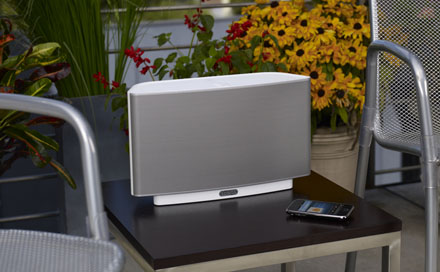Want smarter insights in your inbox? Sign up for our weekly newsletters to get only what matters to enterprise AI, data, and security leaders. Subscribe Now
 It’s been the year of smart, streaming music companies. And if Sonos has anything to say about it, 2011 will also be the year of the smart speaker.
It’s been the year of smart, streaming music companies. And if Sonos has anything to say about it, 2011 will also be the year of the smart speaker.
As Sonos prepares for the upcoming holiday season, it’s bringing its wireless speaker system to mainstream retail outlets like Target, where it will be featured prominently in store displays. Sonos speakers have built-in compatibility with many popular streaming services including Spotify, Pandora, iTunes, Rhapsody and iRadio.
“We set out to be the Bose of the digital age,” said co-founder Tom Cullen in a VentureBeat interview. Cullen added that between cloud-based subscription music services and hardware systems like the ones he’s worked on, “It’s the best time in history to be a music lover.”
Target is just one part of Sonos’ plan to infiltrate the consciousness of the average consumer. “In the last few weeks, we’ve added almost 3,000 retail locations that are selling our products,” said Cullen. “Sonos has been selling in consumer electronics places for years. Target for us was a big change … And they have a huge customer base that looks to them to introduce them to new ideas.”
This shift from retail outlets like Best Buy and Fry’s to the much more accessible Target mirrors a similar shift in Sonos’ userbase. Not too long ago, Sonos speakers were the domain of audiophiles who were also technophiles — folks with commitments to both high-quality audio and home networking. The overlap in that Venn diagram represented a high level of specialized interest.
However, now that Pandora and Spotify are bringing streaming media to a much wider audience, Sonos has the opportunity to attract a large number of new customers. Think about it: If you’re paying a monthly subscription for a streaming music service and you’re carefully curating your stations and tastes on that service, are you going to run it all through your laptop speakers? Or put yourself through the frustration of setting up a home audio network?
For these reasons, Sonos has introduced simpler branding and more competitive pricing. “We’ve moved to a consumer-oriented product,” said Cullen. “That really did change it. We simplified it and brought the price down, and it’s opened us to a lot more people.”
By giving potential customers a more accessible, friendly experience, the company is aiming for exponential growth during a critical moment is music consumption history. We asked Cullen if he thought Sonos’ speakers could ever be as mainstream as the iPad or the Kindle (which, coincidentally, will be selling right next to Sonos gear at Target stores).
“We’re in a smaller space than those huge products, but we are doing something different in the home,” said Cullen. “We built really high-quality speakers that also had brains. They sound really good, the way hi-fi should. Everyone’s going to do it this way.”
Cullen clarifies what he means by “this way” as cloud-based music subscription services that are controlled by intelligent devices like smartphones and played through smart speakers.
His speculation about Sonos’ growth isn’t unfounded, either. Cullen predicts Sonos revenue will double during the final quarter of 2011, and that kind of growth is typical for the company.
“We’ve built it, we’ve shipped it and we’re keyed up to grow 100 percent this holiday,” said Cullen. “We’ve been clipping along at 80 to 100 percent growth depending on the quarter. We’re designing this company to grow at a doubling pace for the next few years.”
In fact, given the explosion of interest in streaming media, we’d be a little surprised if Sonos sales didn’t exceed expectations.
The company is also taking its marketing more mainstream. “This holiday season, you’re going to see us in all kinds of places — everywhere in the culture where music is relevant, from fashion shows to street art,” said Cullen.
Sonos says this is finally a trend in music that will be as good for the goose (that is, the music fans) as it is for the gander (that is, the people and entities involved in producing music).
“The bigger trend, which is good for the artists and the consumer, is subscription through a broadband connection with a smartphone to pick out the music and a smart speaker to play it,” Cullen said. “Suddenly, things are going to get better for the first time in a long time. I think the labels are about to come to a place where they can be happy again.”


